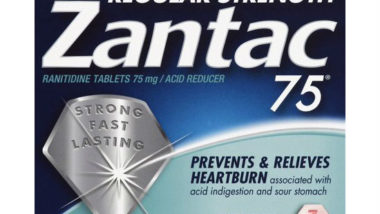Top Class Actions’s website and social media posts use affiliate links. If you make a purchase using such links, we may receive a commission, but it will not result in any additional charges to you. Please review our Affiliate Link Disclosure for more information.

What Are PPIs?
Proton Pump Inhibitors, or PPIs, are a class of medications available by prescription and in over-the-counter form, used to reduce the production of stomach acid. These medications are primarily used for the treatment of gastroesophageal reflux disease (GERD, or acid reflux). Other indications include:
- peptic ulcer
- indigestion
- inflammation of the esophagus and/or gastrointestinal tract
- Barrett’s esophagus
- tumors of the pancreas
The two most commonly-prescribed PPIs in the US are omeprazole (Prilosec) and esomeprazole (Nexium). There is no appreciable difference between the two in terms of efficacy.
How Do PPIs Work?
PPIs disable the enzyme mechanism, known as the “proton pump,” in cells lining the stomach that carry out the final stage of stomach acid production. A metaphor would be pouring sugar into an automobile’s fuel tank. PPIs are more effective than H2 blockers, such as Zantac and Tagamet, and are able to reduce the production of stomach acid by as much as 99 percent.
What are the Risks?
Used at minimal dosage for no more than 2 to 3 weeks, PPIs present few long-term side effects. However, stomach acids are necessary for the digestion of many important nutrients, including protein, vitamin B12, and calcium. Furthermore, these acids help in maintaining healthy gut flora, which are the body’s first line of defense against harmful pathogens.
U.S. News reports that proton pump inhibitors may increase a patient’s risk of getting a particular kind of stomach flu. Research that brought that possibility to light was conducted by researchers at the Sorbonne University in Paris, France, and a study on the findings was published in JAMA Network Open.
Stomach flu, which is not actually the flu, but is really called acute gastroenteritis, is caused by a virus. Happily, an infection with the virus is usually short, but can cause vomiting and diarrhea.
The study observed that people who take PPIs continually are 80 percent more likely to get the stomach flu than those who do not take PPIs. Experts are not exactly sure why PPI use may increase a patient’s risk of getting the stomach flu, but one possible reason is that the drugs reduce acid production in the stomach. This acid, though it is the culprit behind acid reflux and other unpleasant conditions PPIs aim to treat, also may help protect us from viruses. Unfortunately, reducing the acid may expose patients to more infections.
Experts are now questioning the safety of these drugs. Reportedly, they can interact with many medications, and some patients may not be aware of how PPIs may interact with the medications they are taking. This is especially concerning given that PPIs are sold over the counter.
A scientist from the Women’s College Hospital in Toronto says that “very few people need to be on PPIs long term,” though some people may be taking them over a long period of time.
Long-term use can cause a condition known as achlorhydria, a deficiency of stomach acid which ironically, can worsen the symptoms of GERD, result in gastric infections and iron deficiency, and can even lead to stomach cancer.
What Other Serious Side Effects Are Linked to PPIs?
Overuse of proton pump inhibitors have been associated with a lengthy list of serious and even fatal health consequences. In April 2016, a German study appearing in Neurology found that patients who took Nexium or Prilosec on a regular basis had a 44 percent greater risk of developing dementia. Prior to this, other studies linked PPIs to osteoporosis, kidney disease, heart attack and stroke.
In March 2017, the Journal of the American Geriatrics Society published a study out of China which found that elderly patients with dementia who used PPIs were almost 90 percent more likely to come down with pneumonia. PPIs were also among a lengthy list of prescription drugs associated with clinical depression.
Most recently, researchers at the University of Buffalo found an increased risk of kidney disease in PPI patients.
Were the Drug Manufacturers Aware?
Whether drug manufacturers knew about these risks is the question being addressed in current PPI litigation. In 2016, it was estimated that 15 million Americans were taking PPIs for heartburn and indigestion; even today, it was one of the top-selling medications in the world.
The drug companies who have profited so richly from the sale of PPIs either continue to maintain that their product is safe, or have refused to comment on studies suggesting they are not.
It has been estimated that 75 percent of those who take PPIs regularly don’t have an adequate medical reason for doing so. If you or someone you love was injured from long term PPI use, a specialized PPI lawyer may be able to help analyze your potential case.
If you or someone you know took PPI meds and suffered from Nexium stomach cancer or were hospitalized for Nexium kidney problems, you may qualify to file a Nexium lawsuit to pursue compensation for medical bills, pain and suffering, and more. See if you qualify for a Nexium lawsuit settlement by filling out the short form on this page. It’s absolutely free to participate, so act now!
ATTORNEY ADVERTISING
Top Class Actions is a Proud Member of the American Bar Association
LEGAL INFORMATION IS NOT LEGAL ADVICE
Top Class Actions Legal Statement
©2008 – 2024 Top Class Actions® LLC
Various Trademarks held by their respective owners
This website is not intended for viewing or usage by European Union citizens.
Get Help – It’s Free
Join a Free Prilosec, Nexium Lawsuit Investigation
If you qualify, an attorney will contact you to discuss the details of your potential case at no charge to you.
PLEASE NOTE: If you want to participate in this investigation, it is imperative that you reply to the law firm if they call or email you. Failing to do so may result in you not getting signed up as a client or getting you dropped as a client.
E-mail any problems with this form to:
Questions@TopClassActions.com.
Oops! We could not locate your form.












